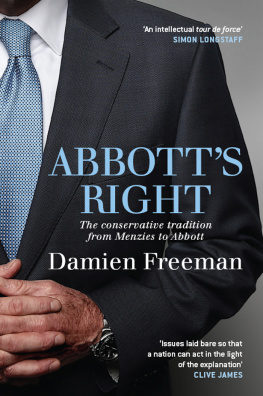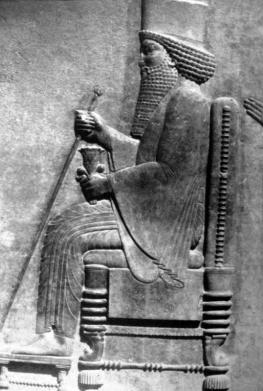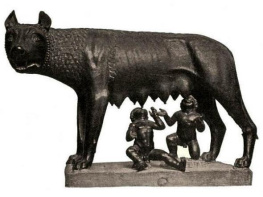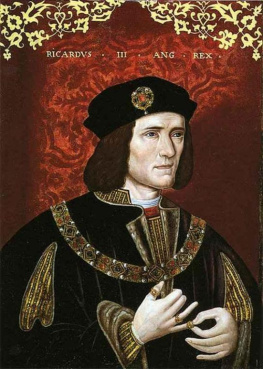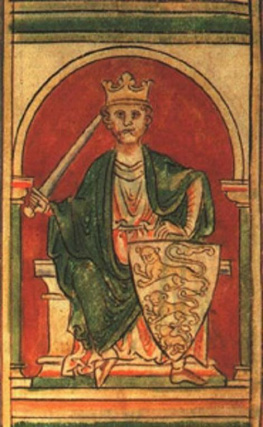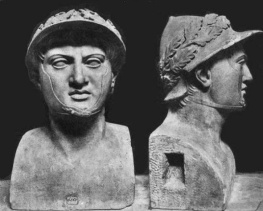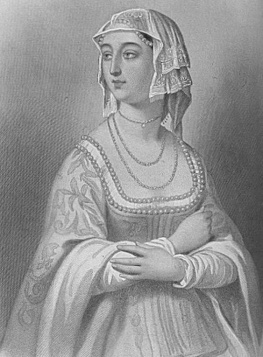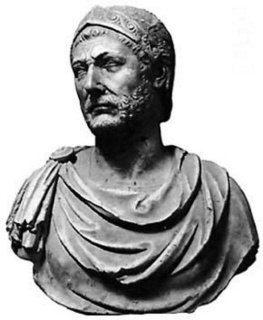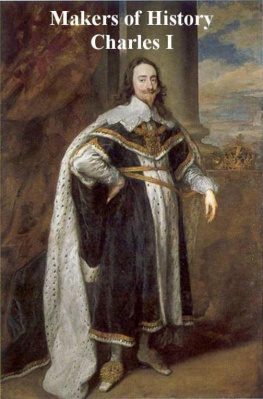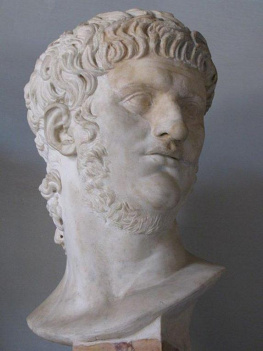Damien Freeman is a writer, lawyer and philosopher who is currently a visiting fellow at the PM Glynn Institute, Australian Catholic University. Together with Shireen Morris, he edited The Forgotten People: Liberal and conservative approaches to recognising indigenous peoples (MUP, 2016).
ABBOTTS RIGHT
The conservative tradition
from Menzies to Abbott
Damien Freeman

MELBOURNE UNIVERSITY PRESS
An imprint of Melbourne University Publishing Limited
Level 1, 715 Swanston Street, Carlton, Victoria 3053, Australia
www.mup.com.au
First published 2017
Text Damien Freeman, 2017
Design and typography Melbourne University Publishing Limited, 2017
This book is copyright. Apart from any use permitted under the Copyright Act 1968 and subsequent amendments, no part may be reproduced, stored in a retrieval system or transmitted by any means or process whatsoever without the prior written permission of the publishers.
Every attempt has been made to locate the copyright holders for material quoted in this book. Any person or organisation that may have been overlooked or misattributed may contact the publisher.
Cover design by Philip Campbell Design
Typeset by Sonya Murphy, Typeskill
Printed in Australia by McPhersons Printing Group
National Library of Australia Cataloguing-in-Publication entry
Freeman, Damien, author.
Abbotts right/Damien Freeman.
9780522871883 (paperback)
9780522871890 (ebook)
Includes index.
Abbott, Tony, 1957
Liberal Party of Australia.
ConservatismAustralia.
PoliticiansAustraliaAttitudes.
Political leadershipAustralia2001
AustraliaPolitics and government2001
To Lloyd Waddy QC and Julian Leeser MP
Se non ci siamo anche noi, quelli ti combinano la repubblica.
Se vogliamo che tutto rimanga come , bisogna che tutto cambi.
Guiseppe Tomasi di Lampedusa
Foreword
This book is the first in a series of short studies of some of the major strands of political philosophy in Australia and how they inform the practice of politics. The series is an initiative of the PM Glynn Institute, the public policy think-tank of Australian Catholic University.
The conservative tradition of political philosophy in Australia is not as well known as some other traditions, and certainly not as well understood. This book sets out what conservatism means as a distinct cast of mind, rather than as a particular set of ideas.
Its sources lie in feelings of gratitude to the values, institutions and tradition that have shaped Australian society, rather than various intellectual propositions about them. It is often equated with opposition to change, but is better understood as a particular approach to change, pragmatically drawing on the values within a tradition to embrace new values and groups and to respond to new circumstances.
The book briefly considers the part conservatism has played in shaping the approach to politics of three earlier Liberal prime ministers before examining in more detail its influence for Tony Abbott. Other factors have over-shadowed the significance of Abbotts writings as a thoughtful articulation of the conservative cast of mind, and the book brings this into better focus.
The PM Glynn Institute has been immensely privileged to have Damien Freeman with us as a Visiting Fellow to research and write Abbotts Right, and I hope it will make a significant contribution to political thought and discussion in our country. The Visiting Fellowship for the next book in the series has been named for Sir Peter Lawler OBE GCPO. It will focus on the Australian Labor tradition and the influence of distributism and Catholic social thought within it.
Michael Casey
Contents
Afterword by Tony Abbott
Battle cry
I N 2009, TONY Abbott published Battlelines. He was a member of Malcolm Turnbulls shadow cabinet, and was still licking his wounds after the Liberal Partys defeat at the hands of Kevin Rudd in 2007. He had served as Minister for Health and Ageing from 2003 until 2007 in John Howards last ministry, and as Leader of the House of Representatives from 2002 until 2007 in the Australian Parliament. Time that would have been spent governing had now been spent thinking, reflecting, and writing.
These were no newfound diversions. Before entering parliament, he had published The Minimal Monarchy while Executive Director of Australians for Constitutional Monarchy and then, as federal Member for Warringah, How to Win the Constitutional War. He wrote no books during his time in the ministry, although he did revisit an earlier career as a journalist, writing opinion pieces for various newspapers.
Having challenged Malcolm Turnbull as Leader of the Opposition in late 2009, Abbott led the Coalition to a near victory against Julia Gillard in 2010. A decisive victory over Kevin Rudd followed in 2013, after Rudd wrested the leadership back from Gillard, who had deposed him three years earlier. Abbott served as Prime Minister until 15 September 2015, the day after he was successfully challenged by Malcolm Turnbull, having survived a leadership spill motion on 9 February earlier that year.
In Battlelines, Abbott traverses much intellectual territory. He reflects on the experiences that have shaped him as a person and a politician. He evaluates the policies and politics of the Howard and Rudd years, tries to pin down the liberal and conservative aspects of the philosophy of the Liberal Party, catalogues the problems that remain for the next Coalition government to address, and explains the problems that he sees in the relationship between the Commonwealth and the Statesand his proposal for reforming this relationship. Towards the end, he writes:
This book is not a history of the Howard Government, but it does canvass what can be learnt from its experience. Its not a political-science tract, but it has explored the values and instincts that drive the Liberal Party. Its not a party manifesto, although there are new policy ideas here that are consistent with our traditions. Its not a volume of memoirs, although it obviously has drawn on my personal experience. Last, its not a job application, because I expect that the existing team will lead the party to the next election. I hope it might serve to rally my fellow Liberals and to persuade others that politics is a venture worth engaging in.
As it turned out, he did lead the party through the next two elections to become Australias twenty-eighth prime minister.
Abbotts assessment of these years is found in three essays commissioned by Quadrant in early 2016 about the economic policy, foreign policy, and politics of his time as prime minister. In one of his more circumspect moments, Abbott writes in Battlelines:
For years I had said, somewhat glibly, that politics is a vocation. It takes losing government to appreciate what that really means. Only someone reconciled to living without all the trappings of success really has a vocation. Opposition naturally strips away most of the cheer squad, leaving just the stark question: are you still willing to serve? As the German sociologist Max Weber has noted, politicians have to understand the comparative smallness of their own role in the unfolding of events and the inevitability of failure in some of their most treasured projects. Only those who still think its worth the hazard have grasped the true calling of politics.
How much more starkly must the question have stood before him after his colleagues lost confidence in his ability to serve on 14 September 2015? In such circumstances, it is hard to imagine what it would mean to grasp the true calling of politics.
Next page
